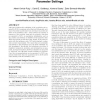9405 search results - page 118 / 1881 » Computing a Model of Set Theory |
JUCS
2008
14 years 10 months ago
2008
: Reasoning about incomplete qualitative temporal information is an essential topic in many artificial intelligence and natural language processing applications. In the domain of n...
105
click to vote
ACML
2009
Springer
15 years 4 months ago
2009
Springer
Enterprises have accumulated both structured and unstructured data steadily as computing resources improve. However, previous research on enterprise data mining often treats these ...
GECCO
2007
Springer
15 years 4 months ago
2007
Springer
This paper analyzes the scalability of the population size required in XCS to maintain niches that are infrequently activated. Facetwise models have been developed to predict the ...
CODES
2010
IEEE
14 years 8 months ago
2010
IEEE
Due to the ever increasing system complexity, deciding whether a given platform is sufficient to implement a set of applications under given constraints becomes a serious bottlene...
IWANN
2009
Springer
15 years 4 months ago
2009
Springer
We survey on the theoretical and practical developments of the theory of fuzzy logic and soft computing. Specifically, we briefly review the history and main milestones of fuzzy ...

